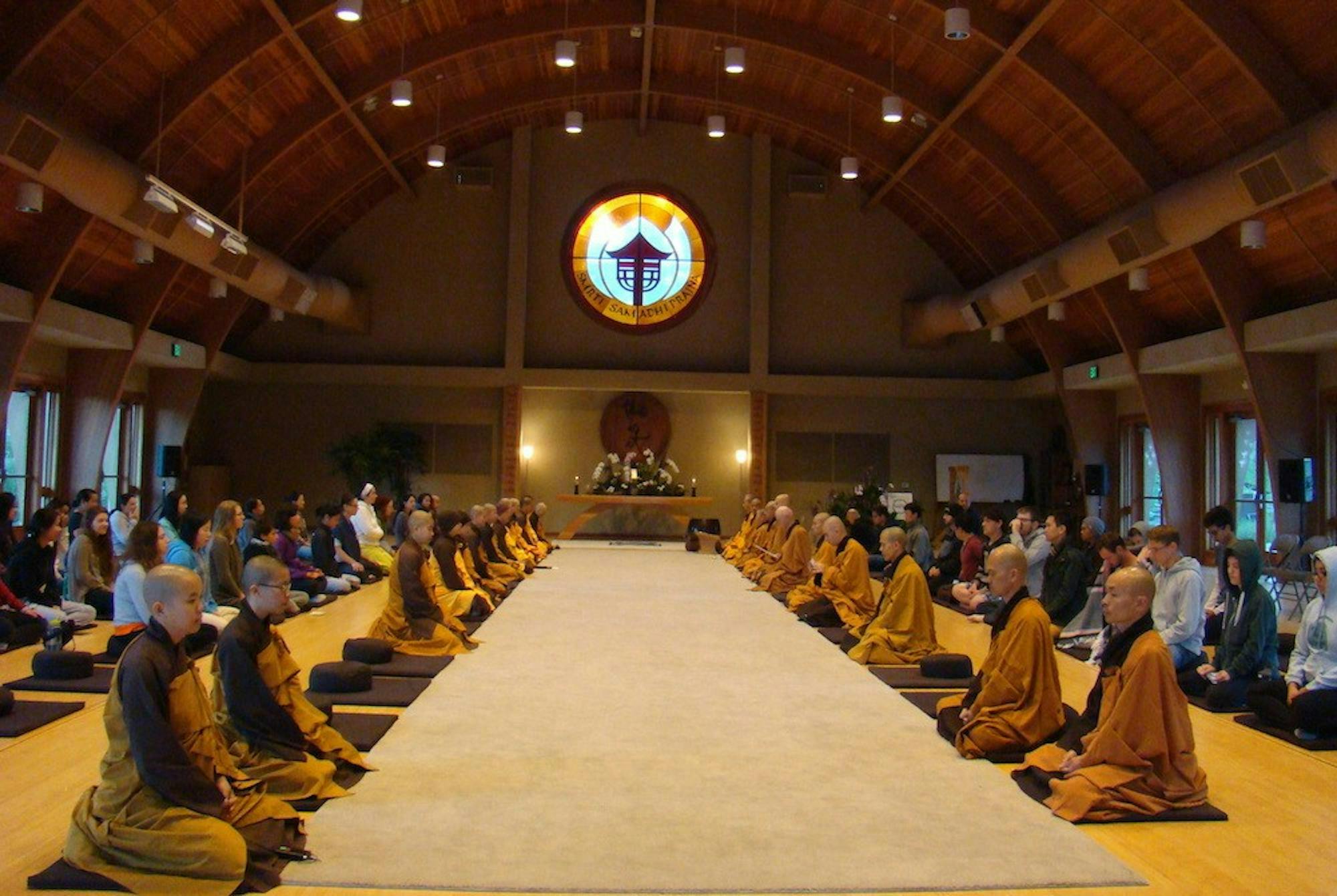On April 22, Dartmouth welcomed 11 senior monastic Dharma teachers to engage with students, faculty and the wider Hanover community for a week-long series of mindfulness programming. Their visit is being co-sponsored by the Student Wellness Center, the William Jewett Tucker Center and the Geisel School of Medicine.
The monks, who practice in the Plum Village Buddhist tradition — a branch of Buddhism named after the Plum Village Monastery in France — reside at the Deer Park Monastery in Escondido, California and the Magnolia Grove Monastery in Batesville, Mississippi, according to the Plum Village Monastics website.
This is the second year that the Plum Village monks have visited Dartmouth, who last came to campus in 2023. Programming included four morning meditation sessions in Rollins Chapel, three mindful lunches at the Class of 1953 Commons, three evening mindful walks and two weekend long retreats.
Geisel professor Diane Gilbert-Diamond said she discussed the idea to create a mindful physiology course with Deer Park Monastery Brother Pháp Lưu ’97, who had the idea to visit the College. Gilbert-Diamond, who teaches a mindful physiology course, said she was inspired by a retreat she attended at the monks’ California monastery two years ago.
“[During the retreat], I just felt so free to be myself, my genuine self — it just touched me,” Gilbert-Diamond said. “There’s so much happiness to see people living happily and wanting true happiness for other people as well.”
Gilbert-Diamond said she kept practicing mindfulness after the retreat ended. She and Pháp Lưu now conduct mindfulness and health research together, Gilbert-Diamond added. She explained that keeping mindfulness centered in her life has helped her to be happier and more productive at work.
“One of the most important lessons that can come from mindfulness practice is that we can learn to even recognize that we’re stressed, and we can learn to understand what is leading to our stress,” Gilbert-Diamond said. “Through that awareness and understanding, we can sometimes learn to let go of some of that stress.”
Sydney Fortner ’24 said she first learned of the monastics last spring through friends who were enrolled in Gilbert-Diamond’s course BIOL 3, “Mindful Physiology.” She said she was influenced by her friends to start meditating and is now a part of the Zen Club on campus. Fortner said is assisting a mindfulness retreat this weekend with the Zen Club, which will involve deep relaxation, meditation, mindful eating and mindful walking.
“A lot of the mindfulness that’s been sort of promoted in Western culture is a productivity-based mindfulness, and that’s sort of how I got into it as well,” Fortner said. “As I’ve continued to practice, I’ve realized that it’s a lot more about living in the present moment and being okay with the stress that you’re experiencing … I definitely think that it’s been an actual life changer.”
The monastics also engaged with students by visiting classes, where they spoke with and fielded questions from students. Nitya Agarwala ’25 said the monks visited her class, ENGS 15.09: “Design Ethics,” where they described designing their life to reduce anger and maximize compassion.
Joanna Jou ’26 said the monks also visited her class, REL 19.39, “Auto/Biography Across Buddhist Traditions,” and described the experience — after attending the mindfulness orientation talk at Rollins Chapel the previous day — as “incredible.”
“It was just really rejuvenating and nourishing just to kind of hear about their life and how they came to be,” she said.
Student Wellness Center director Caitlin Barthelmes said mindfulness is a large part of the SWC’s offerings to students. The monks’ visit provides the Dartmouth community with a new and beneficial way to learn about mindfulness, she explained.
“This visit from the monastics to learn from folks who are so deeply connected to the roots of that spiritual tradition and incorporate those practices into their way of being is a really unique opportunity to both learn and witness and uplift these skills that can be so useful for all of us at Dartmouth — students, staff and faculty alike,” Barthelmes said.
Gilbert-Diamond added that practicing mindfulness does not need to be “time-consuming” and is very “adaptable.” She suggested that students focus on “grounding themselves” by paying attention to the present moment.
“Most of the mindfulness I practice is not sitting on a cushion — it’s while I’m talking to somebody, I’m aware that I’m talking and I’m here,” Gilbert-Diamond said. “My mind is not wandering elsewhere.”

Casey Bertocchi is a junior from Wilmette, IL studying government and environmental science. Outside of The D, she likes to sail, write satire, and take film photos with her Nikon N90.




